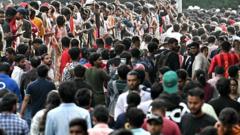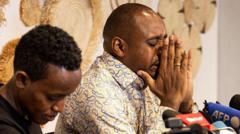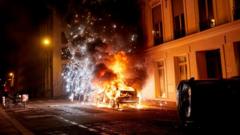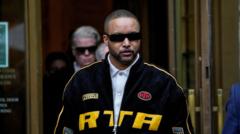Kenya's national high-school drama competition witnessed a dramatic confrontation as police resorted to tear gas to control escalating tensions surrounding a contested play, raising serious concerns over freedom of expression.
Tear Gas Disperses Crowd at Kenya's High School Drama Competition
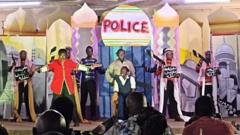
Tear Gas Disperses Crowd at Kenya's High School Drama Competition
Chaos Erupts at Annual Event Amidst Controversial Performance and Protests
In a surprising turn of events, Kenya's national high-school drama competition was marred by chaos when police deployed tear gas to disperse a large crowd gathered to witness a controversial performance. The play, titled "Echoes of War," is set in a fictional kingdom where youth grapple with disillusionment towards their leaders and depicts clashes with law enforcement. The performance has been closely associated with last year’s youth protests against tax increases and became a flashpoint of controversy at the competition.
Initially disqualified from the festival under ambiguous circumstances, the play's inclusion was reinstated following a High Court's ruling. The plot thickened when its author, Cleophas Malala—a former senator—was detained by police, preventing him from meeting with the students for essential final rehearsals. His release without charges was celebrated as a victory for the students, who staged a brief walkout chanting the national anthem before police sealed off the venue.
"Who are we performing for if there's no audience?" exclaimed one of the students amidst frustrations directed at police for mismanagement and perceived harassment. The Education Minister, Julius Ogamba, criticized Malala's involvement, questioning why a politician was permitted to write scripts for students, thus raising concerns about the intersection of politics and education.
Amnesty International and various opposition leaders condemned the government’s heavy-handed approach, signaling a trend of state-sponsored repression of free expression. Chief Justice Martha Koome emphasized that Malala’s detention violated a court order, undermining judicial authority and the rule of law, a sentiment echoed by other prominent figures within the opposition. Amidst the turmoil, voices continue to call for the students’ right to perform on stage like their peers, asserting that artistic expression should prevail over political disputes.
Initially disqualified from the festival under ambiguous circumstances, the play's inclusion was reinstated following a High Court's ruling. The plot thickened when its author, Cleophas Malala—a former senator—was detained by police, preventing him from meeting with the students for essential final rehearsals. His release without charges was celebrated as a victory for the students, who staged a brief walkout chanting the national anthem before police sealed off the venue.
"Who are we performing for if there's no audience?" exclaimed one of the students amidst frustrations directed at police for mismanagement and perceived harassment. The Education Minister, Julius Ogamba, criticized Malala's involvement, questioning why a politician was permitted to write scripts for students, thus raising concerns about the intersection of politics and education.
Amnesty International and various opposition leaders condemned the government’s heavy-handed approach, signaling a trend of state-sponsored repression of free expression. Chief Justice Martha Koome emphasized that Malala’s detention violated a court order, undermining judicial authority and the rule of law, a sentiment echoed by other prominent figures within the opposition. Amidst the turmoil, voices continue to call for the students’ right to perform on stage like their peers, asserting that artistic expression should prevail over political disputes.






